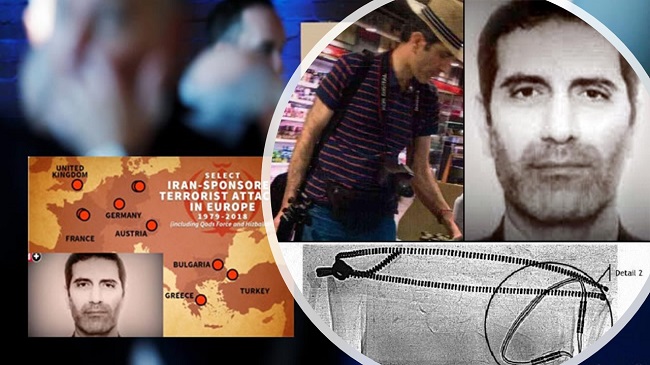On Thursday, February 4, 2021, a Belgian federal court is expected to hand down a verdict in the case of a high-ranking Iranian diplomat who is accused of leading an attempted terrorist operation in the heart of Europe. That operation was fortunately thwarted by law enforcement, but if it had been successful it might have disrupted an international movement for Iranian democracy, killed the Resistance leader Maryam Rajavi, and killed or wounded any of the dozens of European and American lawmakers and foreign policy experts who were in attendance at the target event, a gathering of tens of thousands of Iranian expatriates organized by the National Council of Resistance of Iran.
The attack in question was set to be carried out on June 30, 2018, but two would-be bombers were arrested in Belgium before they could cross into France while carrying 500 grams of the high-explosive TATP. Their arrest was followed the next day by that of the diplomat, Assadollah Assadi, who was traveling in Germany just outside the boundaries of his diplomatic immunity. Assadi’s diplomatic post was that of third counsellor at the Iranian embassy in Vienna, and the investigation into his activities reveals that he stood at the head of a network of clandestine operatives that spanned at least 11 European countries.
This revelation helps to underscore the fact that the Assadi case is part of a much larger pattern of Iranian activity on European soil. It is something that some Western policymakers and other supporters of the NCRI have been trying to call attention to for a long time. In so doing, those same individuals have accused European governments of turning a blind eye to threats against their own national security. If Assadi is convicted, as now seems all but inevitable, it could be a watershed moment in Iranian-Western relations, which serious critics of the Iranian regime may welcome as a sign of forthcoming challenges to that regime’s longstanding impunity.
Tehran’s recognition of that impunity is perhaps the best explanation for its willingness to risk an international incident by ordering an attack that would have almost certainly claimed high-profile Western figures as collateral damage in the effort to kill Mrs. Rajavi. Prosecutors in Assadi’s case have been unequivocal in their statements assigning ultimate blame for the plot to figures at the top of the regime’s leadership. The terrorist-diplomat, they explained, was not operating as a rogue agent but was a reliable conduit for the Iranian regime’s violent foreign policy.
This notion has been strongly reaffirmed by the regime’s decision to stand by Assadi at every turn. Iran regime’s Foreign Ministry has officially taken the position that Assadi’s consular employment makes him the beneficiary of diplomatic immunity, and that this immunity should apply all throughout Europe, regardless of the seriousness of the charges he is facing. The Ministry persistent in that argument even after it was revealed that Assadi had attempted to intimidate European authorities into dropping his case, telling his Belgian interrogators that there were numerous Iran-backed militant groups all throughout the region watching to see whether Europe would “support them.”
That threat, backed up by the regime itself, only seemed to further validate the conclusion that Tehran believes it can get away with virtually anything. And unfortunately, that belief is well-founded. Western governments and judicial authorities have indeed overlooked some of Iran’s worst malign behaviors in the interest of maintaining normal diplomatic relations and reaching out to so-called moderates within the ruling system. As just one example, in 1992, two Iranian operatives were released from detention in France despite having been identified as participants in the assassination of Kazem Rajavi, the NCRI’s ambassador to the UN, two years earlier. As the killers were escorted to the airport, a judge vaguely explained that it had been decided this course of action was in France’s national interest.
For its part, the Iranian regime may not have been surprised by the decision. Although there still a question mark hanging over the idea of assassinations being carried out on Western soil, as Rajavi’s was, it had already been established that Western authorities were willing to neglect Iran’s efforts to stamp out the pro-democracy Resistance. In 1988, activists for that movement had attempted to raise alarms in Western media and directly to Western policymakers about a rising tide of politically-motivated executions in Iranian prisons. In most cases, their concerns were buried beneath a false narrative of nascent Iranian moderation, and within about three months, the regime had executed approximately 30,000 individuals, the vast majority of them members of the People’s Mojahedin Organization of Iran (PMOI-MEK).
This long and egregious history of Western neglect calls for so much more than the prosecution of a single Iranian terrorist operative. That is, of course, an essential first step, but it will take concerted action from a broad coalition of European powers to conclusively repudiate Iran’s regime assumption of impunity. When the guilty verdict has come down and international attention has been re-focused on Assadi’s role as the head of a complete terrorist network, then the democratic nations of the world should move to downgrade their relations with the Iranian regime.
Iranian embassies are the centers for Iran’s terrorism in Europe, and they are the one who are facilitating regime’s terrorism abroad. The international community should close Iranian embassies and isolate the Iranian regime to the fullest extent possible.
